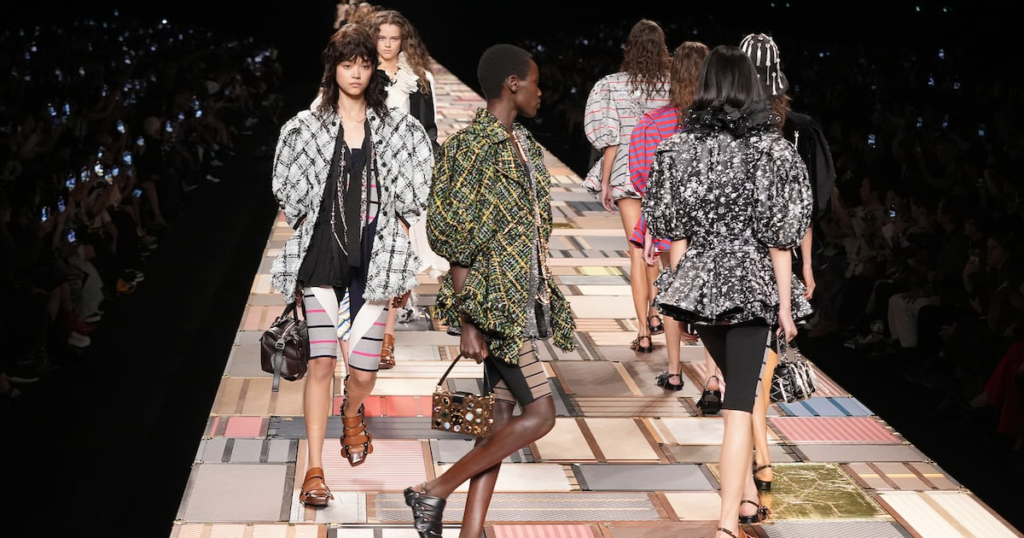LVMH’s key fashion and leather goods division reported a 5% organic sales decline in the third quarter, well below expectations. Analysts had expected growth of 0-2%.
The owners of Louis Vuitton, Dior and Loewe typically outperform the broader luxury goods sector due to their unparalleled marketing budgets and global competitiveness for retail real estate and talent. The conglomerate’s weak sales could signal tougher times ahead for its smaller rivals. Italy’s Ferragamo also reported third-quarter results on Tuesday, with sales down 7.2%.
Groupwide, LVMH’s third-quarter organic sales fell 3% to 19.1 billion euros ($21 billion). LVMH said the figure represented “good resilience in the current situation.”
Luxury demand, which has gradually cooled from post-pandemic highs, has fallen sharply across major regions this year. Macroeconomic headwinds and aggressive price increases that have driven off less affluent buyers have left fashion brands struggling to maintain momentum, especially as consumers shift spending back to other priorities such as health, wellness and travel. It’s becoming difficult.
Chief Financial Officer Jean-Jacques Guiony defended the price increases, saying: “Do you really think that if we hadn’t raised prices the way we have in the past, we would have had double-digit (growth) today?” I really don’t think so,” he said.
China’s doldrums
Chinese customers are in the spotlight. Sales in Asia ex-Japan fell 16%, but Japan, which had been a major destination for Chinese tourists due to the weaker yen, slowed significantly, with sales rising 20% compared to 57% in the previous quarter. There was an increase.
“Consumer confidence in China is back to record lows seen during the coronavirus pandemic,” Guiony said.
Many Chinese customers missed out on the post-pandemic luxury sales boom. Domestic sales, which soared in certain quarters, couldn’t fully offset the loss of big-ticket purchases Chinese shoppers were making overseas.
Asked whether the situation in China is cyclical or represents a more structural, long-term change, Guiony said: Classes in China etc. I see no reason why we wouldn’t be in a position to recover after a cyclical recession like the one we’re experiencing today. ”
A series of stimulus measures announced last month raised hopes for a recovery in major markets, but investors and analysts are divided on whether they will have a significant impact on demand. “The Chinese authorities are well aware that today’s consumption is a bit of a problem. I have no idea whether these measures will be sufficient or whether they will be supplemented by further measures in the future. But this clearly shows that they are taking this issue very seriously,” Guiony said.
Sales in the United States and Europe were more resilient, growing 0 percent and 1 percent, respectively.
brand challenges
Investors are questioning whether LVMH can make a soft landing for Christian Dior after the brand’s sales nearly quadrupled from 2017 to 2023. An investigation into the French haute couture house’s Italian supply chain threatens to further reduce demand for LVMH’s second-largest brand.
LVMH does not break out sales for individual brands. Asked whether Dior had a double-digit decline, Guiony remained mum, saying only: “Vuitton’s (growth) is a little above average (minus 5 percent).” Dior is a little below that. ”
LVMH’s watches and jewelry division, which also owns Bvlgari, Tag Heuer and Hublot, fell 4%.
The author shared Flourish’s data chart.To view embedded content in this article and other articles you visit in the future, you must accept and consent to the use of cookies and similar technologies by our third-party partners such as YouTube, Instagram, and Twitter.accept
US jeweler Tiffany & Co. has made significant investments since acquiring LVMH in 2020, including an overhaul of a quarter of its global store network and a major renovation of its New York Landmark flagship store. Despite this, they continue to report lackluster growth. The group plans to proceed with the renovation of more stores despite the economic downturn.
“We shouldn’t expect double-digit growth tomorrow. But we are seeing gradual improvement,” Deputy Chief Financial Officer Cecile Cabaniss said of the brand.
LVMH’s retail division, which operates Sephora, and its perfume and cosmetics division, dominated by Parfums Christian Dior, both posted modest growth, with sales up 2% and 3%, respectively.
LVMH’s wine and spirits division has been hardest hit, as the group struggles to get cognac sales going in the key Chinese market and the product is embroiled in a trade war with Europe. , sales decreased by 7%. A poor champagne crop could create further headwinds next year.
Disclosure: LVMH is part of a group of investors that together hold a minority interest in the fashion business. All investors have signed a shareholder document guaranteeing BoF’s complete editorial independence.



